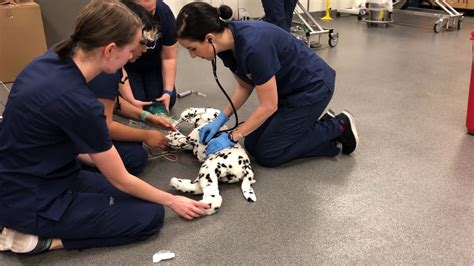Veterinary careers have become increasingly popular in recent years, and for good reason. The veterinary field offers a wide range of career opportunities, from working directly with animals to conducting research and developing new treatments. In Texas, the Houston Community College (HCC) Veterinary Technology program is empowering students to pursue their passion for veterinary careers.
Why Choose a Career in Veterinary Technology?
Working in veterinary technology can be a rewarding and challenging career path. Veterinary technicians play a crucial role in the care and treatment of animals, from routine check-ups to emergency surgeries. The demand for skilled veterinary technicians is high, with the Bureau of Labor Statistics predicting a 16% growth in employment opportunities through 2029.

In addition to the job prospects, a career in veterinary technology also offers a sense of personal fulfillment. Many veterinary technicians report feeling a deep sense of satisfaction and purpose in their work, as they are able to make a positive impact on the lives of animals and their owners.
What Does a Veterinary Technician Do?
Veterinary technicians perform a wide range of tasks, from routine administrative duties to hands-on medical procedures. Some of the key responsibilities of a veterinary technician include:
- Taking vital signs and recording medical history
- Conducting routine tests and procedures, such as blood draws and urinalyses
- Assisting with surgeries and other medical procedures
- Providing patient care and comfort, including feeding, grooming, and exercising animals
- Maintaining medical records and updating patient information
- Communicating with pet owners and providing education on animal care and health
The HCC Veterinary Technology Program
The HCC Veterinary Technology program is designed to provide students with the knowledge and skills needed to succeed in this rewarding field. The program is accredited by the American Veterinary Medical Association (AVMA) and is offered at the HCC Coleman College for Health Sciences.

The program includes classroom instruction, laboratory training, and clinical experience, providing students with a comprehensive education in veterinary technology. Course topics include:
- Anatomy and physiology
- Pharmacology and toxicology
- Radiology and imaging
- Anesthesia and surgery
- Medical records and office management
Benefits of the HCC Veterinary Technology Program
The HCC Veterinary Technology program offers a number of benefits to students, including:
- Hands-on training and clinical experience
- Small class sizes and personalized instruction
- Affordable tuition rates
- Preparation for the Veterinary Technician National Examination (VTNE)
- Job placement assistance and career counseling
What Can I Do with a Degree in Veterinary Technology?
With a degree in veterinary technology, the career possibilities are endless. Some potential career paths include:
- Veterinary technician in a private practice or animal hospital
- Veterinary assistant in a research laboratory or university setting
- Animal care specialist in a zoo or wildlife sanctuary
- Veterinary sales representative or pharmaceutical sales representative
- Veterinary educator or instructor

How Do I Get Started?
If you're interested in pursuing a career in veterinary technology, the first step is to research programs in your area. The HCC Veterinary Technology program is a great option for students in Texas, offering a comprehensive education and hands-on training.
To get started, you can:
- Visit the HCC website to learn more about the program and admission requirements
- Contact the program director or advisor to ask questions and schedule a tour
- Apply for admission to the program and begin your journey to a rewarding career in veterinary technology






Conclusion
A career in veterinary technology can be a rewarding and challenging path, offering a sense of personal fulfillment and a wide range of career opportunities. The HCC Veterinary Technology program is a great option for students in Texas, providing a comprehensive education and hands-on training. By researching programs and getting started, you can begin your journey to a rewarding career in veterinary technology.
What is the job outlook for veterinary technicians?
+The job outlook for veterinary technicians is excellent, with a predicted 16% growth in employment opportunities through 2029.
What is the difference between a veterinary technician and a veterinary assistant?
+A veterinary technician is a trained professional who performs medical procedures and tests, while a veterinary assistant provides support and care to animals.
What are the admission requirements for the HCC Veterinary Technology program?
+The admission requirements for the HCC Veterinary Technology program include a high school diploma or equivalent, completion of prerequisite courses, and a minimum GPA of 2.5.
